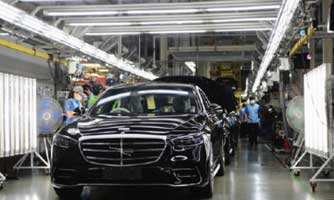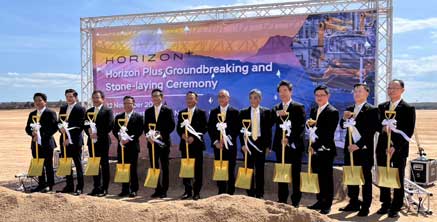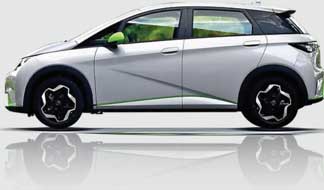Country Focus: Gaining headway in the electric vehicle sector
Thailand is not cutting corners in policies and investments when it comes to its electric vehicle (EV) sector. It is, in fact, speeding up the growth of its EV sector as part of its commitment to lowering carbon emissions, adds Angelica Buan in this report.
Putting the brakes on carbon emissions
Thailand, dubbed as the Detroit of Asia, being the top automotive producer in the ASEAN and the 11th largest car manufacturer globally, aims to achieve carbon neutrality by 2050, and net zero emissions by 2065.
It has pledged to reduce greenhouse gas (GHG) emissions by up to 25% by 2030 in accordance with the Paris Agreement at the 26th UN Climate Change Conference (COP26).
According to the Ministry of Natural Resources, Thailand has pursued decarbonisation in the transportation sector, which produced close to 76 million tonnes of carbon emissions in 2019.
In 2022, after the Covid-19 limits were lifted, transportation-related carbon emissions increased to 79.6 million tonnes. Thailand's transportation carbon emissions from oil and natural gas combined exceeded 28.3 million tonnes from January to April 2023, representing a 3.51% increase over the same time last year, according to Ministry of Energy data.
Industry players stepping up
Industry players have stepped up to the challenge of reducing carbon emissions. Shell Company of Thailand recently collaborated with the Electricity Generating Authority of Thailand (EGAT) to conduct research of clean energy technologies such as carbon capture and storage (CCS), carbon capture utilisation and storage (CCUS), and renewable energy generation. The study focuses on reducing GHG emissions and propelling Thailand towards its net-zero emission goal by 2065.
As part in the country's carbon neutrality commitment, EGAT has implemented the "Triple S" approach, which includes source transformation to increase renewable energy share in the mix, and the development of new technologies to support renewable electricity generation.
It is also focusing on increasing the reforestation of 160,000 ha of land and a study of CCUS technology. Other than that EGAT supports mechanisms to encourage public participation in GHG gas reduction through energy saving projects; as well as through EV deployment.
The collaborative study will address renewable energy, CCUS, hydrogen fuel, and ammonia as alternate power generation sources.
Thailand will, however, continue to rely on fossilfuel electricity generation to provide energy security and meet domestic demand. The outcome of this collaboration will be applied to power plants and other future EGAT initiatives aimed at Thailand's development and global environmental challenges.
Thailand is about to change lanes in its energy mix, which is now dominated by natural gas. The National Energy Plan (NEP) 2022 includes measures to minimise carbon emissions. With more renewable energy on the horizon in the coming years, it is only fitting to promote the use of EVs on a larger scale, with the country on track to produce 30% of domestic EVs by 2030.
A clear path for EVs
Thailand has implemented a number of policies to encourage the use and production of zeroemission vehicles (ZEVs), railway expansion, and the development of public transportation systems.
Thailand's National EV Roadmap is aimed at transforming the country into an EV hub within the ASEAN region, with targets of producing 250,000 EVs, 53,000 electric motorcycles, and 3,000 electric public buses by 2025, and increasing EVs' share of total domestic vehicle production to 50% by 2030 - up from the previous 30% based on the 30@30 policy.
This amounts to having every EV sold in the country made locally by 2035 and increasing the overall number of EVs to 2.5 million by 2040, according to Chandler MHM’s 2023 Thailand Energy Transition outlook report.
Accelerating the deployment of EV charging points and accompanying infrastructure, as well as power grid management and the production of EV parts, batteries, and storage, are all priorities.
As well, tax breaks have fueled local demand for EVs while also attracting investment in the EV sector.
Counterpoint Research's Global Passenger Electric Vehicle Model Sales Tracker indicated that Thailand accounted for over 60% of Southeast Asia's EV sales volume in the third quarter of 2022, followed by Indonesia and Singapore.
Battery electric vehicles (BEVs) accounted for 61% of sales, with plug-in hybrid electric vehicles (PHEVs) accounting for the remainder.
Well-positioned as a regional EV hub
Thailand's rise to prominence as a key EV hub for OEMs in the region and around the world has been accelerated by highly favourable government policies that support the entire automotive industry value chain, including the production of batteries, driving systems, and other EV-related infrastructure such as power grid management systems.
Home-grown Thai entrepreneurs are already building EVs and developing the infrastructure to power them. Energy Absolute, a listed Thai company with a market value of US$10 billion, is selling electric buses and boats, has an electric car ready to launch and is building what to date is the country's biggest network of charging stations.
Other local companies, including start-up MuvMi and long-established water transportation operator Chao Phraya Express Boat Co., are replacing the country's iconic but previously heavily polluting "tuktuk" auto rickshaws and diesel-powered fast river boats with emission-free electric versions.
Thailand attracts foreign investment in EV market

Many OEMs are establishing manufacturing facilities in Thailand, where incentives such as tax breaks are in place for both investors in the EV supply chain and vehicle purchasers.
Automaker Mercedes-Benz has rolled off its completely electric Mercedes-EQS in Bangkok, leaving a mark in Thailand's progress from a traditional automobile making base to a regional forerunner in EVs, the Board of Investments (BOI) stated.
The German luxury carmaker not only chose Thailand as its first location in Southeast Asia to manufacture the EQS, but also to build high-performance lithium-ion batteries that can power the vehicle for more than 700 km on a single charge.
Other automakers, according to BOI, have signed up for a government incentive plan to promote EV sales and production in Thailand, under which the government is offering subsidies ranging from US$2,000 to US$4,400 per vehicle depending on the model and battery capacity.

Foxconn Technology Group, the world's largest contract electronics business has picked Thailand as one of its first two locations in the world to develop EVs. Foxconn is collaborating with Thailand's state-owned oil and gas firm, PTT, to launch Horizon Plus, a joint venture that expects to invest between US$1-US$2 billion to build finished automobiles for other manufacturers using Foxconn's modular platform and software.
With production set to begin in 2024, the partners hope to be producing between 150,000 and 200,000 vehicles/year by 2030 at Thailand's Eastern Economic Corridor (EEC), an areabased initiative encompassing an integrated infrastructure that will position Thailand as a vital gateway to Southeast Asia, China, and the rest of the Asia-Pacific.
Combined, Chinese vehicles accounted for nearly 78% of the Thai EV market in the first quarter of this year, with the rest of the market shared by models from Tesla and Volvo. This is spurring on Chinese EV auto makers such as Hozon New Energy Automobile that has tied up with Thailand's Bangchan General Assembly. Construction started in March on Hozon's plant, which has a designated production capacity of 20,000 vehicles/year and is due to start operating early next year.

Meanwhile, BYD, China's biggest EV manufacturer, is building its first overseas EV plant in the country, with Thai industrial developer WHA Group. Located in Rayong, the plant, which started construction in March, is scheduled to see vehicles roll out in 2024, with a capacity of 150,000 EVs/ year. It will serve as a hub for BYD's EV production and sales in Thailand and neighbouring member countries of ASEAN.
In a related development, PTT, in collaboration with partners PTT Oil and Retail Company (OR), Bangkok Industrial Gas Company (BIG), Toyota Daihatsu Engineering and Manufacturing (TDEM), and Toyota Motor Thailand Company (TMT), has opened Thailand's first hydrogen fueling station (HRS) for fuel cell electric vehicles (FCEV) in the Bang Lamung district of Chonburi province.
(PRA)
Subscribe to Get the Latest Updates from PRA Please click here
©2023 Plastics and Rubber Asia. All rights reserved.

©2023 Plastics and Rubber Asia. All rights reserved.
Home Terms & Conditions Privacy Policy Webmail Site Map About Us
















